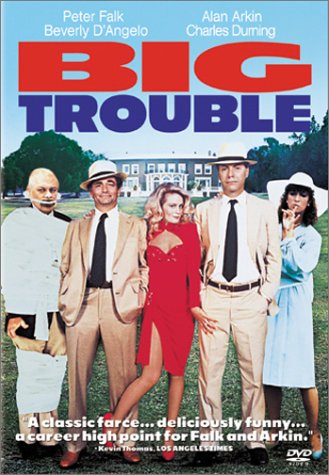**/**** Image B+ Sound B
starring Peter Falk, Alan Arkin, Beverly D'Angelo, Charles Durning
screenplay by Warren Bogle
directed by John Cassavetes
by Travis Mackenzie Hoover From the depths of the files marked "for completists only" comes John Cassavetes's Big Trouble, a film that defies all but the most determined attempts to fit it into the master's canon. Not only is the director's raw emotionality nowhere in evidence here, but the unforced aesthetics that are his hallmark are totally unsuited to the broad and dialogue-dependant farce screenplay by Andrew Bergman (writing under the pseudonym Warren Bogle). It's hard to think of a bigger mismatch of director and material–unless it's Robert Altman doing a teen comedy called O.C. and Stiggs (which, regrettably, happened the following year). I'd suggest a double bill for the diehard auteurists among us, but the disillusionment would be so shattering that I doubt that any of them would survive the experience.
In all fairness, Big Trouble is much better than that ill-fated Altman venture, and can be seen as an interesting example of a helmsman subverting assigned material: Parachuted in to replace another director, Cassavetes appears to have pretended that it's another movie and hoped that it would all work out in the end. On paper, the picture involves uptight Leonard Hoffman (Alan Arkin), an insurance salesman whose triplet sons have been accepted to Yale; Leonard is, alas, scrambling to secure financing for their tuition. Enter Blanche Rickey (Beverly D'Angelo), the wealthy Tennessee Williams wife whose husband Steve (Peter Falk) has been given six weeks to live. The two hatch a plot to make $5M off a policy that only pays when the victim dies on a train, à la Double Indemnity. It's not until the phoney accident takes place that the truth is revealed: Steve is a con artist planning the ultimate score. His scheme has dragged Leonard's future–and his sons'–into serious jeopardy.
Is this really a Cassavetes picture? I suppose that Big Trouble could seem vaguely related to his concerns–the transformation of a repressed family man at the hands of free-spirit criminal veers dangerously close to the director's insistence on the primacy of emotion. (Essentially, it's like the wake scene in Husbands with Falk trying to bully some catharsis out of Arkin's fusty old lady.) But this only goes so far, and most of the time you're aware of the disparity of styles between director and screenwriter. The script is quite deliberately mild–one never believes for a moment that any lasting damage can be incurred, even as the plot trades up from fraud to kidnapping to terrorism. In classic Cassavetes, the slightest tic is of earth-shattering importance, meaning that he's got one strike against him going into this wisp of a screenplay.
The director tries to fight the deliberate nature of the script by short-circuiting the dialogue and letting the action ebb and flow. But while this blows off the fake snappiness of the genre, it results in something amorphous and weird. A typical scene involves the co-conspirators, having kidnapped the insurance investigator (Charles Durning) who is hip to their plot, meandering roadside considering their options: a regular director would have made a sharp distinction between the horrified Arkin and no-worries Falk, but Cassavetes renders the scene with little crosscutting, and as a result, the laughs dissolve into a feeling of what-the-hell-is-going-on-here. Cassavetes doesn't have the insane focus of classical pop, and while that's why we love him, there's no denying that his attempts to colour interestingly inside the lines end in failure.
The problem isn't so much that Big Trouble is neither a classic farce nor typical Cassavetes, it's that it isn't really much of anything else. The film is a freak of nature without home or purpose, and while it isn't especially painful, it leaves you with nothing but chaos. Moreover, it's completely convictionless–and if there's one thing we expect from Cassavetes, it's strong convictions. All said, this bizarre anomaly makes a depressing capper to a brilliant career, and will have you longing for the excesses of the great one's least compromised work.
THE DVDThe platter is of surprising quality when you consider the low priority it must have been for distributor Columbia TriStar. The 1.85:1 anamorphic widescreen image is reasonably good: while blacks are somewhat bleached-out and darkened scenes have a hint of grain, the colours are otherwise as vibrant as they can be given the hideous mid-'80s pastels being rendered. The 1.0 mono soundtrack is similarly satisfactory, with no bars to intelligibility, though the clarity of Bill Conti's (awful) score is often much better than the diegetic sound itself, and consequently rather jarring. Poorly-transferred trailers for the Falk vehicles The Cheap Detective and Murder by Death, as well as a rather fresher one for I Spy, round out the disc.
93 minutes; R; 1.85:1 (16×9-enhanced); English DD 2.0 (Mono); CC; DVD-5; Region One; Columbia TriStar





![The X Files: Black Oil; The X Files: Colonization; The X Files: Super Soldiers [Four-Disc Mythology Collection] - DVDs The X Files: Black Oil; The X Files: Colonization; The X Files: Super Soldiers [Four-Disc Mythology Collection] - DVDs](https://i0.wp.com/filmfreakcentral.net/wp-content/plugins/contextual-related-posts/default.png?resize=150%2C150&ssl=1)
![Summer with Monika (1953) [The Criterion Collection] - Blu-ray Disc summerwithmonika1](https://i0.wp.com/filmfreakcentral.net/wp-content/uploads/2012/07/summerwithmonika1.jpg?resize=150%2C150&ssl=1)